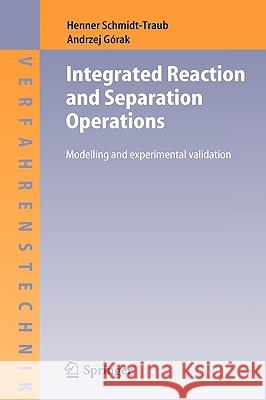Integrated Reaction and Separation Operations: Modelling and Experimental Validation » książka
Integrated Reaction and Separation Operations: Modelling and Experimental Validation
ISBN-13: 9783540301486 / Angielski / Miękka / 2006 / 366 str.
Economic needs as well as ecological demands are major driving forces in improving chemical processes and plants. To meet these goals processes have to be intensified in order to get products of higher quality, to increase yield by reducing or even suppressing by-products and to minimise energy consumption. A preferred principle for such intensifications is process - tegration, especially integration of reaction and separation operations. S- entific research in this field has been boosted by certain extremely succe- ful examples like the Eastman-Kodak process for methyl acetate or the MTBE process which are milestones for this method. In 2002 the German Research Foundation defined process integration as one of the major - search topics for the next decade. In 1998 the Department of Biochemical- and Chemical Engineering at the University of Dortmund decided to pool its activities for concerted - forts in process integration and to form a joint research cluster. Our interest was to find out the general challenges as well as obstacles of integrated processes and to work out methods for their design and valuation. Soon it became clear that theoretical work only cannot give reasonable answers.











